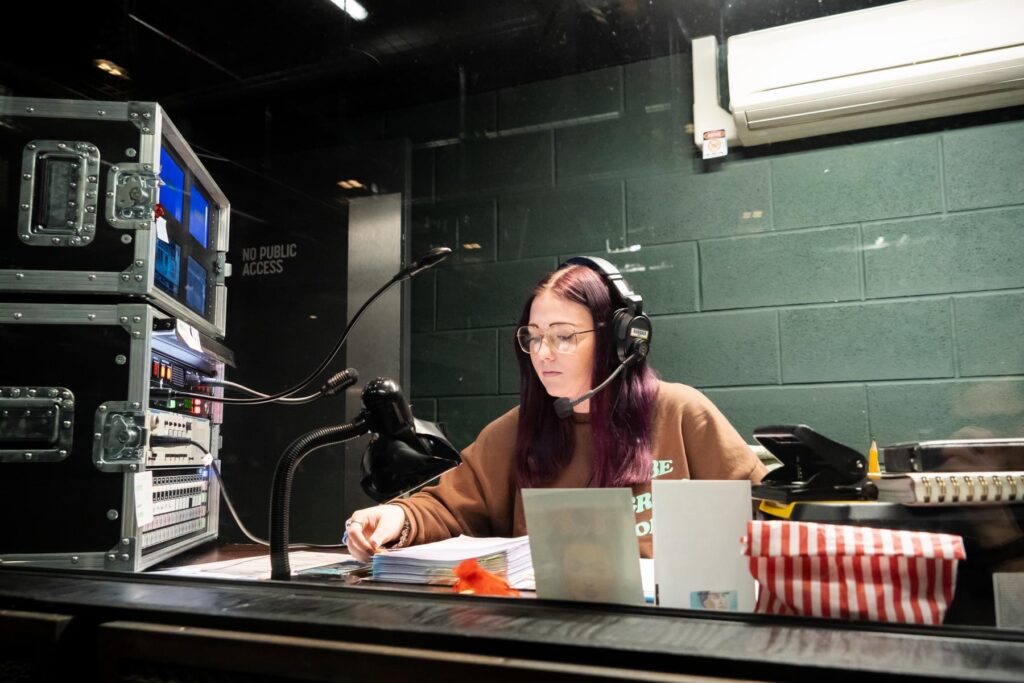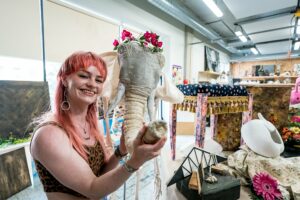Foundation Degree Skills Training Ensures Wider Career Opportunities
Leading arts professionals encourage the next generation to build expertise on solid foundation skills for a long-term career.
Mountview has rewritten how the technical production courses will be delivered from 2023, in direct response to industry demands and to ensure graduates build a solid set of skills so they can adapt quickly in the face of future challenges. We spoke to some industry contacts who have enjoyed long and diverse careers in theatre, film and live events to hear why they feel a broad skill set at the start of a career is a wise investment.
Read on for:
- How foundation skills ensure flexibility for a diverse career
- Possible Career Pathways for Technical Production Arts Graduates
- Why take a Foundation Course before Specialising
- The new look Mountview courses on offer
- Where to find more information
If you have a passion for a specific aspect of the arts (or anything!) then the temptation to focus just on that one thing is strong. There’s plenty of evidence to show that specialists in every field earn more than generalists, but entry level opportunities show a different trend.

Photo by Stephen Glass
How foundation skills ensure flexibility for a diverse career
Over the last few years, the industry has seen its fair share of challenges that have given the workforce a pause for thought. This led to many creative professionals necessarily harnessing their transferrable skills to find new ways to diversify their careers. Those specialists who fully grasped the wider opportunities in the context of their work enjoyed the most success, adapting to new ways of working. They could do this because they saw the bigger picture and used their experience and a range of skills to move into different areas of work.
The work available for graduates is often to support companies in more than one aspect of production and it’s unlikely a graduate will move immediately into a specialist job like design. That’s why a base of different skills is vital to get those first jobs.
‘Newer entrants certainly benefit from a wider element, and a wide foundation can help further into a career as well (I moved to a lot of staging & rigging as a production manager having had an early career in lighting for example).’
Paul Moore, Head of Production and Facilities at Manchester International Festival (MIF)
The technical advances made during the Covid–19 lockdowns are a good example of what can be achieved when different expert professionals who understand the working practices of colleagues come together to create events. Having a good grasp of where your specialism fits in the context of a full production is vital.
‘As a Stage Manager, there have been countless times where I’ve needed to use my skills in lighting, sound or construction so I feel it’s absolutely essential to have a broad understanding of other departments. Gaining a foundation before specialising allows students to make a more informed choice when deciding on a career path and will ensure they are able to communicate effectively with people from all disciplines once they are out there working, the benefits of which should not be underestimated!’
Elizabeth Morgan, Head of Stage Management Training at Mountview
Photo by Cesare De Giglio
Possible Career Pathways for Technical Production Arts Graduates
When it comes to advice on training and work opportunities in the performing arts, you’ll find lots of information online. A good place to start is the FDS (Federation of Drama Schools) website, where you can find out about the different courses on offer in the UK Conservatoires. The pathways open to technical production graduates include theatre, film, TV and concerts and there are very well-paid opportunities in events and corporate hospitality. Some of the long-term career options that are referenced in the technical theatre field are among the highest paid in the UK arts scene.
‘Long term graduates can progress to senior positions e.g. Designer, Company Manager, Venue Manager, Production Manager, Wardrobe supervisor, Scenic artist or Master Carpenter. There are so many different options and pathways! Graduates also move into related industries e.g. becoming an events manager, teaching or setting up their own companies.’
Reference: FDS website
All these career pathways are highly rewarding, and leadership roles can come with the added responsibility of creating a welcoming and important cultural space for the surrounding communities they serve, sometimes on a national or international scale. What’s interesting is the diversity of the skill sets required – which are far from niche.
‘There seem to be much more opportunities for the new generations of scenic artists to diversify and pick up other skills, and I’d recommend anyone to take up these opportunities. Colleagues of mine, with small to medium sized scenic construction companies are always keen to hire scenic painters with a wide range of skills, from basic carpentry to experience with CAD etc. Working in a small team, it can be very beneficial to have a wider skillset and of course makes you very employable! ‘
Samantha Fellows, Artist (Scenic Art)
Why take a foundation degree before specialising?
You can get straight into your chosen area of expertise by taking an apprenticeship within a company or alongside an industry mentor, and that’s often very appealing as there can be a salary attached. However, smaller companies will favour team members who can support production by delivering more than one skill and the senior jobs require an oversight and appreciation of the wider industry. To take on the top jobs you’ll need to be able to adapt, problem solve and plan while working collaboratively.
‘People coming into the Live Events industry often start their career on extreme ends of the spectrum: either fully knowing exactly what they want to do or having absolutely no idea but full-well knowing it is going to be in the industry. Getting trained in foundation skills means whichever of those two camps you fall into, you’ll be well set up to walk into your first roles confidently with the right approach and the freedom to move roles if the first one isn’t quite the right fit. If I knew then what I know now, I would have built those foundation skills so much earlier and made my journey through the industry much easier.’
Tom Wilkes, Director of Collaborative Creations support agency for major events and festivals.

Highlights of Graham Osbourne’s varied career in model making, set building and scenic art. Credit GeeoDesign (Instagram)
Some of the UK’s regional theatre leaders would agree that it’s best not to specialise too much, too soon and that your expertise is richer in the long run when you understand the bigger picture. To create an in-house team that is self-sufficient and mutually supportive, having a broad range of skills really makes a difference.
‘Whilst many students will end up specialising at the end of their foundation year, I believe it is very useful to have had basic experience working in alternative disciplines. It can give a person a more rounded view of the arts and greater understanding of the work that others are doing. So much work within the wider creative sphere is collaborative. To have a basic knowledge of what their work may involve and show how you and they can make a project work effectively can only be a good thing.’
Graham Osborne, Model Maker at GeeoDesign (Instagram)
The new-look Mountview courses
Following the upheaval of the last few years and on the advice of our valued industry partners and guest professionals, we have streamlined our courses to meet the needs of the industry now and prepare students for a rewarding and extensive career.
So, what’s new?
The new Foundation degree at Mountview will be delivered over two years with a first year that includes an introduction to Lighting and Sound as well as aspects of Stage Management, Prop Making and Scenic Art. Then, in year two, students get hands-on experience working collaboratively on Mountview productions in their chosen specialism. Following this, students have the option take a top-up third year of study to top-up the qualification and gain a BA Hons degree.
During the two foundation years, through a blend of practical workshops, classes and talks, students get a comprehensive introduction to each of these areas before choosing a specialism for their final projects in the second year. We bring in industry professionals who are working on some of the biggest shows, films and events in the UK and internationally.
There are also contextual studies classes that help students to get ready for work. These range from advice on websites and profiles and the ways professionals showcase their portfolios to the different ways of working with artists and practitioners.
‘The realm of technical theatre and stage crafts is international, it enables people to work on so many productions and events, from regional and West End theatre, tourist attractions and festivals to large scale national and international events such as the commonwealth opening ceremonies. The Technical, Stage Management and Scenic & Prop Making courses at Mountview are designed to give the next wave of professionals the comprehensive tools required to start their journey.’
Andy Franks, Mountview Venue & Estate Director, Head of Production Arts
And, with over 30 public performances in our theatres each year, there is plenty of opportunity to put your learning into practice alongside industry professionals, using the latest kit. You’ll also get an overview of the numerous people and other departments who play a part in bringing each production to the stage, from director and choreographer to wardrobe and orchestra.
Lastly, our students work alongside the cohorts of all other courses at Mountview. We train directors, producers, actors and musicians so you’ll have a built-in network to support you and collaborate with when you graduate. There are many examples of students forming companies and producing their own work at festivals and fringe venues. You can read about them in our Alumni News here.

Photo by Steve Gregson
Where to find more information
If you’re not sure which aspect of the performing arts you’d like to work in, a foundation in a range of production skills is a great first step to a lifelong, rewarding career.
Check out the questionnaire bot on Get Into Theatre which might help you decide, and there’s also a helpful list of different theatre jobs on their site here. Many of these are transferrable to film, TV, festivals and concerts as well as corporate events. Other useful information can be found at; PLASA, Lighting & Sound International, the Association of Sound Designers and the Association for Lighting Production and Design. And another useful set of resources can be found on the ABTT website, where you can find resources and useful industry FAQ’s.
You can apply now for all the Mountview courses are listed on the website here and there are more on the FDS (Federation of Drama Schools) website. You might also want to sign up to attend a dedicated Mountview Open Day to meet the team and get a feel for our workshops and theatres.
Finally, a reminder that more skills can mean more career destinations which in turn leads to a bigger network. And it’s your network of colleagues who will refer you for even more opportunities. As Mark Walmsley from the Arts and Culture Network reminds us:
‘With over 90% of arts and culture professionals now freelancing and 85% of contracts awarded via referral, the basics of the new world of work and the importance of networking have never been more important.’
Mark Walmsley of The Arts and Culture Network
Good luck with your applications for whichever route you choose to take!
Mountview applications are open for 2023 entry. Apply Today.

